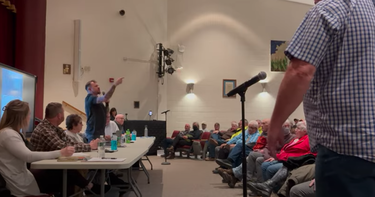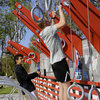Crosier files free-speech lawsuit against Berne
BERNE — Kevin Crosier, who was forcibly removed from a public hearing earlier this year, is suing the town of Berne.
Crosier had attended a packed public hearing on Feb. 20 that the town hosted at the Berne-Knox-Westerlo school auditorium on a controversial ATV law.
When Crosier, a Democrat and former town supervisor, went to the microphone to address the Republican-backed town board that evening, Supervisor Dennis Palow stopped him from speaking almost immediately to draw attention to a photo he had on display at the front of the auditorium of what appeared to be Crosier driving a utility vehicle.
“That looks like me,” Crosier said as audience members jeered at Palow for interrupting. “Are you going to allow me to speak?”
Palow said no, claiming that Crosier had done something similar to another former supervisor, Republican Sean Lyons, at a board meeting five years ago.
Palow ultimately ordered Albany County Sheriff’s deputies to escort Crosier out of the hearing despite the fact that Crosier hadn’t broken any of the rules of conduct that Palow had laid out at the beginning of the hearing.
While Crosier initially suggested he might include the sheriff’s office in the suit, the only named defendant is the town of Berne.
Crosier’s complaint, filed this week, alleges that this was a violation of both the United States and New York state constitutions, and that he experienced “embarrassment, humiliation, mental and emotional stress, and a loss of liberty” from the incident. As he had already indicated in a notice of claim earlier this year, Crosier is seeking at least $100,000 in damages.
He is represented by Kevin Luibrand, who filed the suit on Dec. 11.
Crosier had told the town board earlier this year that he wouldn’t sue if the board apologized for the incident; however, no apology was forthcoming.
The only board member who offered a comment to The Enterprise about the incident when prompted was Thomas Doolin, who said he “did not clearly hear an inappropriate comment from Mr. Kevin Crosier. There was only [Crosier’s] beginning comment, ‘The board is responsible for the health and safety…’ Thereafter I am unclear on continued comment due to escalating noisy chatter for his removal.”
However, at the end of the meeting, Palow attempted to justify the removal by saying that Crosier had once done the same thing as supervisor.
“I know everybody got a little upset when a certain member got removed tonight,” Palow had said. “So let me just say this, and you take it for what you want. Five years ago, that same person did it to a previous town supervisor at a board meeting. He actually told him to sit down and shut up, and ‘We’re tired of your lies.’”
Deputy Supervisor Anita Clayton, responding to audience comments, had said, “Yes, it is prejudicial … It’s OK for him to criticize and we have to take it because we are elected officials. That’s right, we are. We are. And there should be decorum.”
Neither Palow nor Clayton responded to an Enterprise request for comment on the lawsuit.
Crosier’s belief that his freedom of speech was denied appears to be well-founded.
In an advisory opinion from 2012, then-Executive Director of the New York State Committee on Open Government Robert J. Freeman wrote that, while a member of the public can be removed from a meeting for violating “reasonable” rules of conduct established by a board, it cannot remove members for non-conduct reasons, such as being from outside the town or having a disagreeable political stance.
“It would be reasonable, in my view, to adopt rules regarding decorum, outbursts, disruptions and the like,” Freeman wrote. “However, barring an individual from attending based on that person's politics or point of view, without more, would be contrary to law.”
Palow had warned the audience at the beginning of the meeting that anyone who disrespected the board would be asked to leave, and escorted out by the sheriff’s deputies if they refused.
All Crosier had said before Palow interrupted him was, “Thank you for allowing me to speak this evening. It’s the town board’s responsibility to protect the health, safety, and financial stability of our community.”



